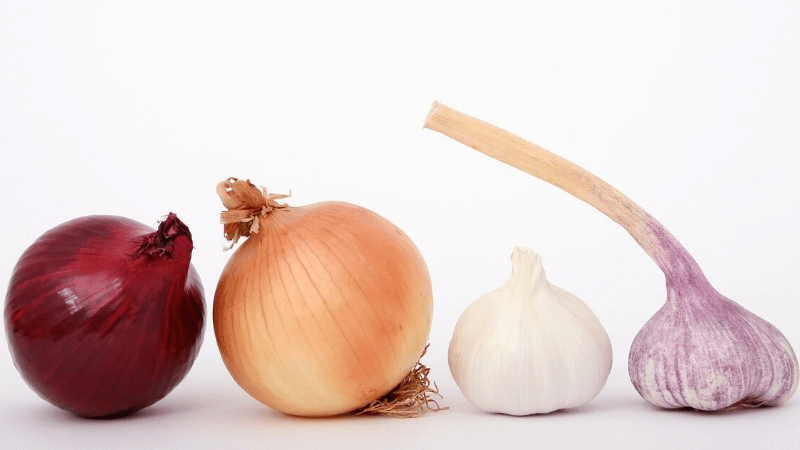The countdown is on to one of the greatest meals of the year! Roast turkey, mashed potatoes and gravy, cranberries, stuffing, pumpkin pie… so many wonderful dishes grace our tables every year on Thanksgiving. The holidays are a crazy and exciting time, filled with good eats and good company. With all of the extra food around, it’s important to remember which foods and ingredients are dangerous for the furry family members among us! Keep reading to learn about food items that may be at your Thanksgiving feast that you should keep away from your pets.
*Allow 3-5 minutes to read the full post*
Onions & Garlic
These flavorful aromatics are essential in any Thanksgiving feast, but they are some of the most toxic foods for pets. Onions and garlic can damage red blood cells when ingested by dogs and cats, causing blood disorders like anemia. Cats are more sensitive to the effects of these foods than dogs are. If a dog or cat has consumed a substantial amount of onions or garlic, vomiting may need to be induced and blood counts will need to be monitored.
Animal Bones
Many pet owners are tempted to treat their dogs to the turkey carcass, or other meat bones. Cooked turkey or chicken bones can be very dangerous to dogs (and cats) if they are consumed, because they can splinter and damage the esophagus when swallowed. If the bone fragment pierces through the wall of the intestinal tract, the pet may become septic. If a pet has eaten a bone, adding extra fiber to the pet’s diet can help move it through the patient’s digestive tract. It’s important to monitor stools for a couple days and look for signs of blood or bone fragments. If the pet is unable to pass the bones, surgery may be required to remove them.
Turkey Carcass
Bouillon
Bouillon cubes can add wonderful flavor to stocks and gravies, but they are extremely concentrated in sodium. If a pet consumes bouillon, they could develop internal water and sodium imbalances (more specifically, hypernatremia). Signs that a pet is suffering from hypernatremia include vomiting, diarrhea, excessive thirst, loss of bodily control, tremors, and seizures. Pets who develop hypernatremia will need to have sodium levels adjusted quickly through IV fluid therapy and oral water intake.
Baked Goods
All of those delicious pastries and desserts that we look forward to after the Thanksgiving meal can cause pets to develop GI upset and pancreatitis. Some baked goods (especially those that are pre-packaged) may contain xylitol, an artificial sweetener that can lower a pet’s blood sugars and sometimes causes liver failure. Pets who have ingested xylitol may need to have their blood sugar levels and/or liver values monitored. Another pastry ingredient to watch out for is raisins — even small amounts of raisins (or grapes) can cause severe symptoms in a pet, including vomiting, diarrhea, loss of appetite, lethargy, dehydration, tremors, seizures and kidney failure.
Pet Poison Helpline: (855) 764-7661
ASPCA Animal Poison Control: (888) 426-4435
We at House Paws wish you and your pets a happy and healthy Thanksgiving!






